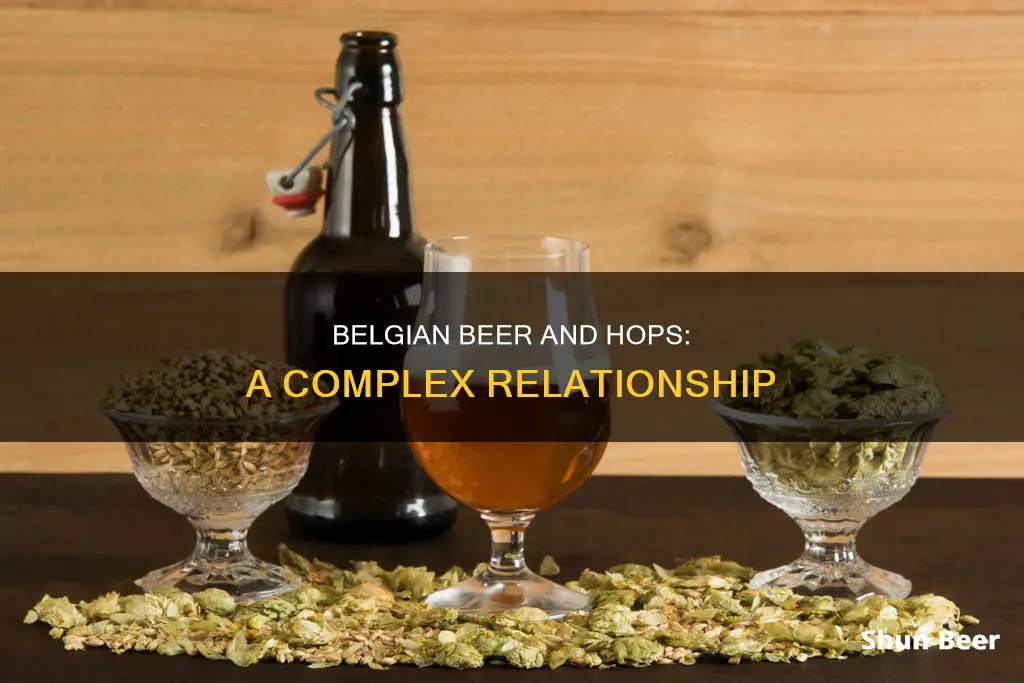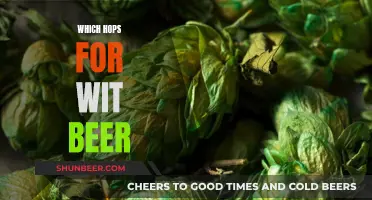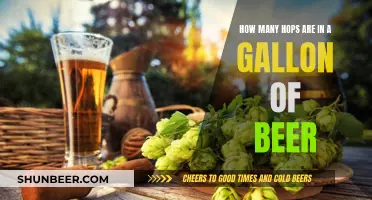
Belgian beer is known for its unique flavour, and hops are a key ingredient in the brewing process. Hops have been cultivated in Belgium for centuries, and while the country is a small hop-growing region, its hops are of high quality. Belgian hops bring a distinctive flavour to beer, with a wide range of varieties offering specific bitterness and pleasant aromas. The type of hops used in brewing impacts the beer's bitterness, aroma, taste, and storage possibilities.
What You'll Learn
- Hops are one of the key ingredients in beer
- Hops have been cultivated in Belgium for centuries
- Belgian hops bring a unique flavour to beer
- Belgium's mild maritime climate and fertile sandy loam are ideal for growing hops
- Belgian brewers use local hops, but also hops from elsewhere, like Fuggles and East Kent Goldings

Hops are one of the key ingredients in beer
Belgium's mild maritime climate and fertile sandy loam create ideal conditions for numerous hop varieties to grow vigorously and crop abundantly. Belgian hop growers offer a wide range of hop varieties, each with its specific bitterness and/or pleasant aroma. Aromatic hops, for example, give beer a herb, flower, or citrus flavour, while 'dual-purpose' hops can be used to add bitterness or aroma. 'Bitter hops' are mainly used to make beer bitter and foster its conservation.
Belgian beers are known for their simplicity, often using just a handful of ingredients. The hard part is getting the right balance of malt and hops. Hops are typically used to balance the beer and are not overpowering or overly aromatic, as found in modern IPAs.
Belgian brewers use a variety of hops, including Styrian Goldings, Saaz, Tettnang, Fuggles, and East Kent Goldings. In Belgian Trappist and abbey beers, hops such as Hallertaur, Spalt, Tett, Vanguard, Perle, and classic German hops are commonly used. The goal is to add a touch of hop bitterness to cut through the sweetness of the malt, rather than creating a strong hop flavour.
Hops and Hormones: The Estrogen-Beer Link Explained
You may want to see also

Hops have been cultivated in Belgium for centuries
Hops are one of the key ingredients in beer, influencing its bitterness, aroma, taste, and storage possibilities. Hops have been cultivated in Belgium for centuries and have been an integral part of the country's beer-making traditions.
Historically, hop farms were spread across Belgium, with the regions of Aalst-Asse and Poperinge serving as the main hubs. Today, hop cultivation is mainly concentrated around the town of Poperinge in West Flanders and a few towns in Wallonia. Belgian hops are known for their high quality, bringing a unique flavor to beers. The country's mild maritime climate and fertile sandy loam soil provide ideal conditions for the vigorous growth of numerous hop varieties.
Belgian hops are grown in family-owned businesses, where the plant is cultivated with love, care, and expertise passed down through generations. The farmers' dedication to their craft and the distinct characteristics of Belgian hops have led to their recognition and appreciation by connoisseurs.
The history of hop cultivation in Belgium dates back to the Middle Ages when the regions of Poperinge and Ypres competed for the linen cloth business. When Ypres secured the trade monopoly, Poperinge turned to hop cultivation to sustain its economy. The region's climate and soil proved ideal for growing hops, and the plant became highly desired by Belgian brewers.
While Belgium's hop-growing sector has faced challenges over the years, with a decline in production and a shift away from native hop varieties, there is a growing interest in aroma hops and initiatives to promote the use of Belgian hops in local beers. The country's rich history of hop cultivation and its resilient farming community continue to shape the country's beer culture and contribute to its renowned brewing traditions.
Wheat Beer and Hops: An Unlikely Friendship
You may want to see also

Belgian hops bring a unique flavour to beer
Hops are one of the key ingredients in beer, influencing its bitterness, aroma, taste, and storage life. While Belgium is a small hop-growing country, its hops are of high quality and bring a unique flavour to beer. Belgian hops are cultivated by family businesses, where the plant has been treated with love, care, and expertise for many generations.
Belgian hops are grown in the country's mild maritime climate and fertile sandy loam, which is ideal for numerous hop varieties to grow vigorously and crop abundantly. Belgian hop growers offer a wide range of hop varieties, each with its specific bitterness and/or pleasant aroma.
The main hub for hop cultivation in Belgium is the town of Poperinge in West Flanders, with 18 hop growers cultivating around 155 hectares of hops in the region. The other main hub is Wallonia, where 3 hop growers cultivate around 21 hectares of hops.
Belgian hops are used in a variety of beer styles, including Belgian ales, lagers, pilsners, and IPAs. The unique flavour and aroma of Belgian hops come from the combination of the country's climate, soil, and the expertise of its hop growers.
Belgian hops have a long history in the country, with cultivation dating back centuries. While hop farms used to be spread across the country, they are now mostly concentrated in West Flanders and Wallonia.
Belgian beers are known for their complex flavours and unique characteristics, and the use of Belgian hops plays a crucial role in achieving this distinct taste profile. The combination of different hop varieties, growing conditions, and brewing techniques contributes to the final flavour of the beer.
Belgian brewers take pride in their craft and pay attention to every detail, from the type of hops used to the fermentation process. This dedication to quality and uniqueness has made Belgian beers renowned worldwide, with a distinct flavour that keeps drinkers coming back for more.
Exploring Mexican-Style Beer: A Hoppy Adventure
You may want to see also

Belgium's mild maritime climate and fertile sandy loam are ideal for growing hops
Belgium's soil composition varies across different regions. Flanders, located near the sea, has mostly sandy and clay soil types. On the other hand, Wallonia, with its hilly terrain, has soil composed of limestone, phyllites, quartzite, shales, and sandstones. The specific soil type in the hop-growing region of Poperinge, West Flanders, is sandy loam, which is well-drained and has a good balance of sand, silt, and clay.
The mild maritime climate in Belgium offers a temperate growing environment for hops, with average annual temperatures ranging from 6 to 14 °C and precipitation between 700 to 850 mm. These conditions are favourable for the development of hop plants, which require moderate temperatures and sufficient moisture. The maritime influence also contributes to a relatively stable climate with fewer extreme weather events, creating a consistent environment for hop cultivation.
Fertile sandy loam soil is ideal for hop plants as it provides a balance of drainage and water retention. Sandy loam allows excess water to drain while retaining enough moisture for the plants to thrive. Additionally, the sandy component of the soil promotes aeration and root growth, while the loam adds essential nutrients and water-holding capacity. This combination results in vigorous growth and abundant yields of hops.
Belgian hop growers cultivate a wide range of hop varieties, each with distinct characteristics that contribute to the unique flavour profiles of Belgian beers. The quality of Belgian hops is highly regarded, and the country's small acreage is known for its high potential. The hops grown in Belgium's mild maritime climate and fertile sandy loam soil bring a distinct flavour to beers, leading some connoisseurs to speak of a "terroir".
In summary, Belgium's mild maritime climate and fertile sandy loam soil create the ideal conditions for growing hops. The temperate weather and well-drained, nutrient-rich soil promote the healthy development of hop plants, resulting in high-quality hops that contribute to the renowned flavour of Belgian beers.
Hops' Role in Extending Beer's Shelf Life and Stability
You may want to see also

Belgian brewers use local hops, but also hops from elsewhere, like Fuggles and East Kent Goldings
Hops are one of the key ingredients in beer, impacting its bitterness, aroma, taste, and storage possibilities. Belgian brewers use a variety of hops, including local hops and hops from other regions, to create their unique beers.
Belgium has a long history of hop cultivation, with farms once spread across the country, particularly in the regions of Aalst-Asse and Poperinge. Today, hop cultivation is mainly concentrated around the town of Poperinge in West Flanders and the towns of Warneton, Maltonne, and Vodelée in Wallonia. Belgian hops are known for their high quality, bringing a unique flavour to beers that some connoisseurs describe as a 'terroir'.
While Belgian brewers emphasise local hops, they also use hops from other regions, such as Fuggles and East Kent Goldings. These hops add bitterness and balance to the beer without being overpowering or overly aromatic. Belgian beers are known for their simplicity, using just a handful of ingredients, with the hard part being achieving the right balance of malt and hops.
Belgian brewers have a wide range of hop varieties to choose from, each with its specific bitterness and aroma. Aromatic hops, for example, give the beer a delicate herb, flower, or citrus flavour, while dual-purpose hops can be used for both bitterness and aroma. Bitter hops, on the other hand, are mainly used to make the beer bitter and improve its conservation.
Belgian beers, such as pale ales, strong pale ales, Trappist and Abbey beers, and saisons, are known for their balance and unique flavours. While hops play a crucial role in these beers, they are not always at the forefront, as the yeast, malt, and spices also contribute significantly to the final product.
Stout Beers: Hops, Their Presence and Purpose
You may want to see also
Frequently asked questions
Yes, Belgian beers use hops. Hops are one of the key ingredients of beer and have been cultivated in Belgium for centuries.
Belgian hop growers offer a wide range of hop varieties, including aromatic hops, dual-purpose hops, and bitter hops. Aromatic hops, such as Cascade, Fuggle, and Saaz, give the beer its distinctive aroma, while dual-purpose hops like Brewers Gold and Chinook can be used for both bittering and aroma. Bitter hops, such as Admiral and Nugget, are mainly used to add bitterness and foster conservation.
Hops are used in Belgian beers to add bitterness, aroma, and flavour, as well as to aid in the beer's storage possibilities. In Belgian beers, hops are typically used to balance the beer rather than being the focal point.







